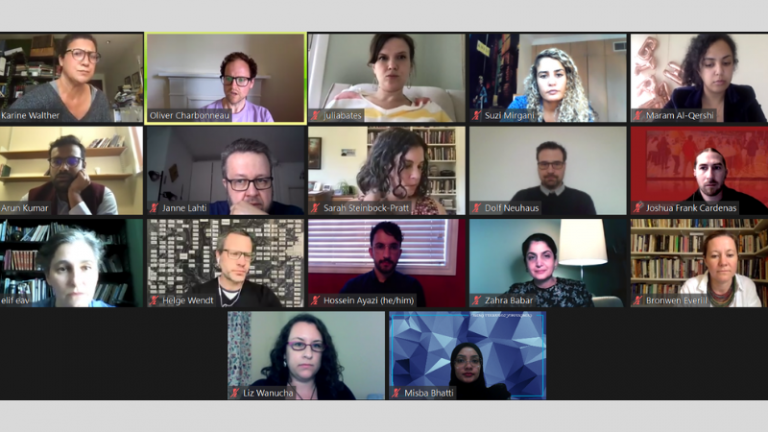American Studies, CIRS Faculty Research Workshops, Race & Society, Regional Studies
The Gospel of Work and Money: Global Histories of Industrial Education Virtual Working Group II

On May 25, 2021, the Center for International and Regional Studies (CIRS) at Georgetown University Qatar held the second virtual working group under its research initiative on The Gospel of Work and Money: Global Histories of Industrial Education. This virtual working group was the first in a series of meetings that will be held between May and August 2021, to present and discuss the chapters contributions for the project. During the May meeting two papers were presented and received feedback and comments from the group.
The first paper titled, “American Sociology’s Promotion of the Industrial Education Model and the Reification of Race,” was presented by Dr. Julia Bates. The paper addresses American sociology’s theoretical promotion of the Industrial Education model. The paper reviews three main sociologists’ use of sociological theory to advocate for the industrial education model. After the first World War, the U.S. Department of Labor worked with a commercial philanthropic institution called the Phelps Stokes Fund to transfer educational policies designed for African Americans to West Africa and South Africa. The US government used and promoted the industrial education model used at Tuskegee and the Hampton institutes for African American education. This model emphasized manual labor, Christian character formation, and political passivity as a form of racial uplift. The model heavily relied upon prominent theories in the sociology of race to propagate this model. Thomas Jesse Jones, who was the educational director of the Phelps Stokes Fund, in particular advocated for the transnational development of the model. W.E.B. Du Bois, a prominent sociologist who was marginalized by the U.S government and American sociology, critiques this model in his works The Crisis and Darkwater. Bates argues that from the works of Jones and Dubois two different sociological conceptions of race emerge. The author will examine the U.S. state’s decision to link African Americans and Africans as similar objects of political intervention and look at Jones’s use of sociology to promote the model’s effect on sociological theories of race.
Dr. Elif Ekin Akşit presented the second paper titled, “Industrial Education in the Late Ottoman Empire and Modern Turkey: Gender, Egalitarianism, and Mathematics.” The paper traces the history of industrial schools in the Ottoman Empire and their subsequent continuation in modern Turkey. Dr. Akşit contends that the development of industrial education in the late Ottoman empire and modern Turkey took place within the context of the transformation from an empire to the republic, and adopting policies and practices of the West became the part and parcel of resisting colonialism. The paper discusses the development of the Girls Industrial Schools in the late Ottoman Empire and their importance in the general development of technical/scientific education and its relation to the ideology. The author proposes to study the question of what it meant to be industrial in the East and West, as well as trace the continuation of the industrial schools in the late-20th and early 21st centuries. These key queries will be addressed with the help of the data collected from students’ accounts as well as state documents on these schools. The article primarily focuses on the gendered dimension of the industrial schools because the author argues that their continuation in the Turkish republic made these girls’ schools the main pillar for establishing the revolution on the societal level.
CIRS will convene the next paper workshop for the project in June where three additional paper contributions will be presented and discussed.
- For the meeting agenda, click here.
- For the participants’ biographies, click here.
- For the research initiative, click here.
Participants and Discussants:
- Elif Ekin Akşit, Ankara University, Turkey
- Maram Al-Qershi, CIRS – Georgetown University in Qatar
- Danya Al-Saleh, University of Wisconsin–Madison
- Lukas Allemann, University of Lapland
- Hossein Ayazi, Williams College
- Zahra Babar, CIRS – Georgetown University in Qatar
- Julia Bates, Sacred Heart University
- Misba Bhatti, CIRS – Georgetown University in Qatar
- Joshua Frank Cárdenas, California Indian Nations College
- Oliver Charbonneau, University of Glasgow
- Bronwen Everill, University of Cambridge
- Arun Kumar, University of Nottingham
- Janne Laht, University of Helsinki
- Suzi Mirgani, CIRS – Georgetown University in Qatar
- Dolf-Alexander Neuhaus, Free Berlin University
- Sarah Steinbock-Pratt, University of Alabama
- Karine Walther, Georgetown University in Qatar
- Elizabeth Wanucha, CIRS – Georgetown University in Qatar
- Helge Wendt, Max Planck Institute for the History of Science (MPIWG) Berlin
Article by Misba Bhatti, Research Analyst at CIRS